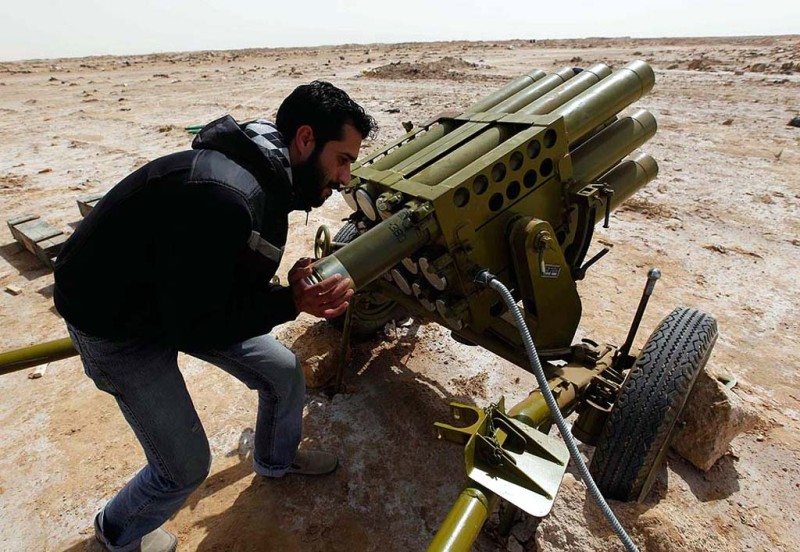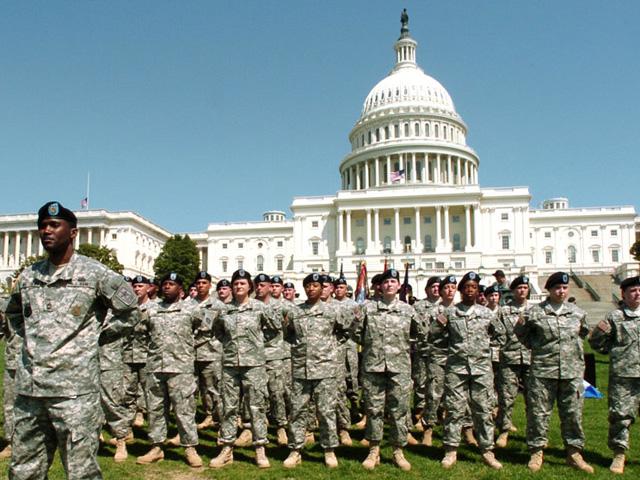Western allies have stepped up “non-lethal” aid to Libyan rebels hours after a rebel armoured unit was hit by apparent NATO ‘friendly fire’, sources said.
The aid is authorised by UN Security Council resolutions imposing sanctions and allowing military action to protect civilians, sources said Thursday.
The aid includes establishing a communications system between rebel fighters and NATO’s base organising air strikes.
General Abdelfatah Yunis, the rebel commander, said in Benghazi that four people — two fighters and two medics — were killed in the Brega attack, 14 wounded and another six people were missing.
He said it was friendly fire, “carried out in error by NATO,” adding that the rebels had informed NATO that they were moving T55 and T72 heavy tanks from Benghazi to Brega.
In Brussels, NATO said it was trying to confirm the reports, but it warned that it would strike any forces threatening civilians.
Rebels and civilians began to flee Ajdabiya soon after NATO hit their armoured unit near the key oil town of Brega, fearing Kadhafi forces were moving on the town.
The strike came as the US general who led the first stage of the coalition air campaign in Libya maintained it was unlikely the rebel forces could oust Kadhafi, saying the conflict appeared to be turning into a stalemate.
General Carter Ham said the international bombing raids had succeeded in protecting civilians for the most part but that Kadhafi’s regime probably would not be removed by military means.
Asked at a Senate hearing about the chances that the opposition could “fight their way” to Tripoli and replace Kadhafi, Ham said: “Sir, I would assess that as a low likelihood.”
And when pressed by Senator John McCain whether the situation was essentially a stalemate or an “emerging stalemate,” Ham said: “Senator, I would agree with that at present on the ground.”
Under tough questioning, the general said a stalemate is “not the preferred solution” in Libya but that outcome appeared “more likely” now than at the outset of the air campaign launched March 19.
But Ham said removing Kadhafi was not part of the UN-mandated mission to protect civilians, and that the US administration wanted to rely on diplomatic and other means to force him to step down.
His comments underscored growing concern in Washington and European capitals that the fight in Libya could be deadlocked, with Kadhafi firmly in control in Tripoli and badly-organized rebels unable to turn the tide even under the cover of NATO-led air power.
France’s Foreign Minister Alain Juppe, however, took a more optimistic view, saying Kadhafi’s regime would inevitably fall.
In Washington, McCain and some other members of the Senate Armed Services Committee slammed the Obama administration for taking what they called a half-hearted approach to the war, saying removing Kadhafi should be part of the military mission.
But Ham warned that the United States had tried “regime change” elsewhere before.
“We have some history in trying to apply military force to regime change where we have been less than successful,” he said, alluding to Iraq.
The general said it was possible an international ground force might be deployed if and when Kadhafi leaves, but warned that an American presence might trigger a backlash in the region.
“I suspect there might be some consideration of that. My personal view at this point would be that that’s probably not the ideal circumstance, again, for the regional reactions that having American boots on the ground would entail.”
Amid calls by some senators to arm and train the rebels before it was too late, Ham said that he had “some indication that some Arab nations are in fact starting to do that at present.”
But the general expressed caution, saying any effort to supply arms had to be carried out carefully to avoid weapons getting into the hands of extremists.
As an example, he cited the danger that militants could seize some of the estimated 20,000 shoulder-launched missiles in Libya, calling it “a regional and an international concern.”
After edging to within 60 kilometres of Kadhafi’s hometown of Sirte on March 28, the Libyan rebels have been steadily pushed back almost 400 kilometers (250 miles) by the superior fire power of Kadhafi’s forces, despite coalition air strikes.
Ham said bombing raids had undercut the regime’s ability to target civilians — except in the besieged city of Misrata.
The rag-tag rebels are struggling to defend Misrata, Libya’s third city, under an onslaught from better armed regime forces.
Ham said Kadhafi had moved tanks and troops into parts of the city and that had made air strikes more difficult to carry out without endangering civilians.
Also Thursday, it was learned that an American reporter for The Atlantic and three other journalists had been captured by Kadhafi’s forces.
Clare Morgana Gillis, who has reported for TheAtlantic.com from Libya, James Foley, an American freelance contributor to GlobalPost.com, Manu Brabo, a Spanish photographer, and Anton Hammerl, a South African photographer, were taken into custody on Tuesday near Brega, The Atlantic said.
News of the capture of the four came as the Kadhafi regime expelled 26 foreign reporters from Tripoli.
Paris-based Reporters Without Borders (RSF) said it was “outraged” by the expulsion of 26 foreign journalists by the Libyan government on the grounds that their visas had expired.











